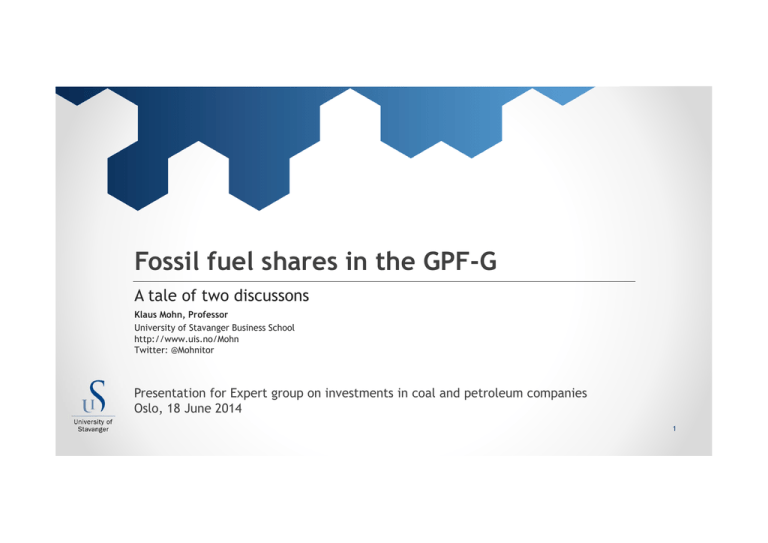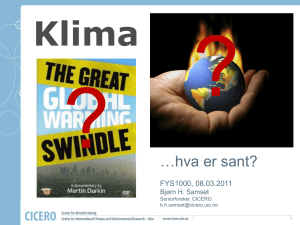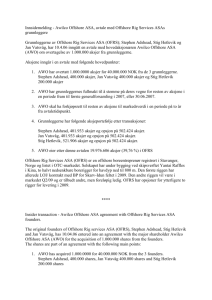Fossil fuel shares in the GPF-G
advertisement

Fossil fuel shares in the GPF-G A tale of two discussons Klaus Mohn, Professor University of Stavanger Business School http://www.uis.no/Mohn Twitter: @Mohnitor Presentation for Expert group on investments in coal and petroleum companies Oslo, 18 June 2014 1 A tale of two discussions Arguments for divestment of fossil shares Diversification Oil and gas exposure National wealth perspective Climate concerns Asset management guided by climate policies Climate concerns Asset management guided by climate policies 2 Divestment for diversification White paper resonse: NO Three arguments against Diversification by default (depletion) Oil price sensitivity of oil shares is limited Oil shares are beneficial to GPF diversification 3 Oil price sensitivity of oil shares Not exactly like other shares Oil shares are odd Resources are scarce Risks are dissimilar 4 Oil price sensitivity of oil shares Oil price sensitivity in the area of 0.2-0.4 Const rM rSMB rHML rEMD rP R2 (adj) N S/L/D S/L/E S/H/D S/H/E B/L/D B/L/E B/H/D B/H/E 0.005 0.007 0.006 0.010** 0.008** 0.007** 0.008** 0.004 (1.46) (1.62) (1.44) (2.46) (2.39) (1.99) (2.845) (1.06) 0.853*** 0.810*** 0.799*** 0.707*** 0.676*** 0.829*** 0.840*** 0.823*** (11.29) (9.47) (9.70) (8.49) (9.49) (10.78) (10.41) (11.54) 1.036*** 1.075*** 1.039*** 1.040*** 0.014 0.065 0.101 0.011 (16.60) (15.20) (15.26) (15.11) (0.24) (1.02) (1.51) (0.18) ‐0.526*** ‐0.788*** 0.648*** 0.981*** ‐0.131 ‐0.241*** 0.323*** 0.363*** (‐5.99) ‐0.616*** (‐7.93) (6.77) 0.677*** ‐0.946*** (10.14) (‐1.58) 0.861*** ‐0.177** (‐2.70) 0.093 (3.44) ‐0.285*** (‐7.16) (6.95) (‐1.028) (9.09) (‐1.237) (1.06) (0.297) 0.211*** 0.252*** 0.216*** 0.192*** 0.220*** 0.188*** 0.224*** (4.39) 0.346*** (4.26) 0.238*** (4.98) (5.26) (4.69) (4.13) (5.52) (4.38) (4.96) (5.98) 0.706 0.712 0.702 0.752 0.356 0.386 0.432 0.502 240 240 240 240 240 240 240 240 rit i iM rMt iSMB rSMBt iHML r HMLt iEMD r EMDt iP r Pt it OLS estimates of augmented Fama-French model based on monthly data from 114 oil and gas companies over the period 1993-2011. t-values in brackets; *) Significant at 90, **) 95 and ***) 99 per cent confidence level, respectively. 5 Source: Misund, Bård and Klaus Mohn (2014). Exploration risk in oil and gas shareholder returns. Working Paper. University of Stavanger. Oil shares beneficial to GPF diversification Questions could be raised Uncertain outlook Brent blend, USD/bbl (@2012 prices) Historical data Structural break Price and policies 6 The elephant in the ground A broader view is required Oil exposure of national wealth Oil exposure of national income Energy and climate policies 7 The elephant in the ground NCS resource estimates and uncertainty intervals ~50 per cent of the volumes remain in the ground 8 Source: Norwegian Petroleum Directorate (2014). Asset management and climate policies Political pressures are building – at home and abroad Concerns Expected returns and risk Effectiveness and efficiency Evaluation and control 9 Asset management and climate policies Some thoughts on effectiveness and efficiency Active vs passive strategies Green venture investments Carbon footprint reporting Development of data Get the incentives right Challenges: reporting and restructuring Total restraint on climate risk Let NBIM work out implications Industry-neutral framework 10 Fossil fuel shares in the GPF-G To divest or not divest… Divest for the right reasons Divestiture as climate policy Safeguard effectiveness and efficiency Protect returns and risk Get incentives right 11 Thank you for your attention Klaus Mohn, Professor University of Stavanger Business School http://www.uis.no/Mohn Twitter: @Mohnitor 12 References • Bernstein, Shai, Lerner, Josh, and Antoinette Schoar. 2013. The investment strategies of sovereign wealth funds. Journal of Economic Perspectives 27 (2), 219‐239. • Bjørnland, H. og L. A. Thorsrud. Boom or gloom? Examining the Dutch disease in a two‐speed economy. Working Paper. Norwegian School of Management. Oslo. • Cappelen, Ådne, Eika, Torbjørn og Joakim Blix Prestmo (2014). Virkninger på norsk økonomi av et kraftig fall i oljeprisen. Økonomiske analyser 3/2014, 31‐42. Statistisk sentralbyrå. • Døskeland, Trond M. 2007. Strategic asset allocation for a country: the Norwegian case. Financial markets and portfolio management 21, 167‐201. • Ministry of Finance. 2014. Forvaltning av Statens pensjonsfond. White Paper 19 (2013‐2014). • Mitchell, John, Marcel, Valerie, and Beth Mitchell. 2012. What next for the oil and gas industry? Royal Institute of International Affairs (Chatham House). October 2012. • Misund, B. and K. Mohn. Exploration risk in oil and gas shareholder returns. Working Paper. University of Stavanger. • Mohn, K. 2013. Strategi etter innfallsmetoden. Dagens Næringsliv, 7. november 2013. • Mohn, K. 2014a. Klimaendring i kapitalforvaltninga. SYSLA.no, 8. mars 2014. • Mohn, K. 2014b. Formueforvaltning og fossil energi. NRK Ytring, 19. mars. 2014. • Norwegian Petroleum Directorate (2014a). Facts 2014: The Norwegian Petroleum Sector. • Norwegian Petroleum Directorate (2014b). Petroleum resources on the NCS 2014 – Fields and discoveries. • Trucost. 2009 (in collaboration with Mercer’s Investment Consulting) . Carbon risks in UK equity funds. Report commisioned by WWF. • van den Bremer, Ton and Frederick van der Ploeg. 2013. The elephant in the ground: Managing oil and sovereign wealth. Working Paper 129. Oxford Centre for the analysis of resource‐rich countries (OXCARRE). Oxford. • van der Ploeg, Frederick and Anthony J. Venables. 2011. Harnessing windfall revenues: Optimal policies for resource‐rich countries. The Economic Journal 121, 1‐30. 13


